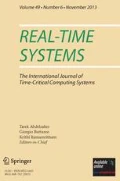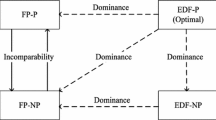Abstract
Uniprocessor schedulability theory made great strides, in part, due to the simplicity of composing the delay of a job from the execution times of higher-priority jobs that preempt it. In this paper, we bound the end-to-end delay of a job in a multistage pipeline as a function of job execution times on different stages under preemptive as well as non-preemptive scheduling. We show that the end-to-end delay is bounded by that of a single virtual “bottleneck” stage plus a small additive component. This contribution effectively transforms the pipeline into a single stage system. The wealth of schedulability analysis techniques derived for uniprocessors can then be applied to decide the schedulability of the pipeline. The transformation does not require imposing artificial per-stage deadlines, but rather models the pipeline as a whole and uses the end-to-end deadlines directly in the single-stage analysis. It also does not make assumptions on job arrival patterns or periodicity and thus can be applied to periodic and aperiodic tasks alike. We show through simulations that this approach outperforms previous pipeline schedulability tests except for very short pipelines or when deadlines are sufficiently large. The reason lies in the way we account for execution overlap among stages. We discuss how previous approaches account for overlap and point out interesting differences that lead to different performance advantages in different cases. Further, we also show that in certain cases non-preemptive scheduling can result in higher system utilization than preemptive scheduling in pipelined systems. We hope that the pipeline delay composition rule, derived in this paper, may be a step towards a general schedulability analysis foundation for large distributed systems.
Similar content being viewed by others
References
Abdelzaher T, Sharma V, Lu C (2004) A utilization bound for aperiodic tasks and priority driven scheduling. IEEE Trans Comput 53(3):334–350
Audsley AN, Burns A, Richardson M, Tindell K (1993) Applying new scheduling theory to static priority pre-emptive scheduling. Softw Eng J 8(5):284–292
Bettati R, Liu JWS (1990) Algorithms for end-to-end scheduling to meet deadlines. In: Proceedings of the IEEE symposium on parallel and distributed processing, pp 62–67, December 1990
Bini E, Buttazzo G, Buttazzo G (2001) A hyperbolic bound for the rate monotonic algorithm. In: Proceedings of the 13th euromicro conference on real-time systems (ECRTS), pp 59–66, June 2001
Chatterjee S, Strosnider J (1995) Distributed pipeline scheduling: end-to-end analysis of heterogeneous multi-resource real-time systems. In: Proceedings of the IEEE international conference on distributed computing systems (ICDCS), pp 204–211, May 1995
Chetto H, Silly M, Bouchentouf T (1990) Dynamic scheduling of real-time tasks under precedence constraints. Real-Time Syst 2(3):181–194
Cruz RL (1991) A calculus for network delay, part II: network analysis. IEEE Trans Inf Theory 37(1):132–141
Fohler G, Ramamritham K (1997) Static scheduling of pipelined periodic tasks in distributed real-time systems. In: Proceedings of the 9th euromicro workshop on real-time systems (ECRTS), pp 128–135, June 1997
Harbour MG, Klein MH, Lehoczky JP (1991) Fixed priority scheduling periodic tasks with varying execution priority. In: Proceedings of the IEEE real-time systems symposium (RTSS), pp 116–128, December 1991
Hawkins W, Abdelzaher T (2005) Towards feasible region calculus: an end-to-end schedulability analysis of real-time multistage execution. In: Proceedings of the IEEE real-time systems symposium (RTSS), pp 75–86, December 2005
Koubaa A, Song Y-Q (2004) Evaluation and improvement of response time bounds for real-time applications under non-preemptive fixed priority scheduling. Int J Prod Res 42(14):2899–2913
Lehoczky J, Sha L, Ding Y (1989) The rate monotonic scheduling algorithm: exact characterization and average case behavior. In: Proceedings of the IEEE real-time systems symposium (RTSS), pp 166–171, December 1989
Liu CL, Layland JW (1973) Scheduling algorithms for multiprogramming in a hard real-time environment. J ACM 20(1):46–61
Palencia JC, Harbour MG (2003) Offset-based response time analysis of distributed systems scheduled under EDF. In: Proceedings of the euromicro conference on real-time systems (ECRTS), pp 3–12, July 2003
Pellizzoni R, Lipari G (2005) Improved schedulability analysis of real-time transactions with earliest deadline scheduling. In: Proceedings of the IEEE real-time and embedded technology and applications symposium (RTAS), pp 66–75, March 2005
Ramamritham K (1990) Allocation and scheduling of complex periodic tasks. In: Proceedings of the IEEE international conference on distributed computing systems (ICDCS), pp 108–115, 1990
Schneider J (2000) Cache and pipeline sensitive fixed priority scheduling for preemptive real-time systems. In: Proceedings of the IEEE real-time systems symposium (RTSS), pp 195–204, November 2000
Spuri M (1996) Holistic analysis of deadline scheduled real-time distributed systems. Technical report RR-2873, INRIA, France
Tindell K, Clark J (1994) Holistic schedulability analysis for distributed hard real-time systems. Elsevier Microprocess Microprogram 40(2–3):117–134
Xu J (1993) Multiprocessor scheduling of processes with release times, deadlines, precedence, and exclusion relations. IEEE Trans Softw Eng 19(2):139–154
Xu J, Parnas DL (1993) On satisfying timing constraints in hard real-time systems. IEEE Trans Softw Eng 19(1):70–84
Zhang N, Burns A, Nicholson M (1993) Pipelined processors and worst case execution times. Real-Time Syst 5(4):319–343
Zhang Y, Lu C, Gill C, Lardieri P, Thaker G (2005) End-to-end scheduling strategies for aperiodic tasks in middleware. Technical report WUCSE-2005-57, University of Washington at St. Louis, December 2005
Author information
Authors and Affiliations
Corresponding author
Additional information
The work reported in this paper was supported in part by the National Science Foundation under grants CNS 07-20513, CNS 05-53420, and CNS 06-13665.
Rights and permissions
About this article
Cite this article
Jayachandran, P., Abdelzaher, T. Delay composition in preemptive and non-preemptive real-time pipelines. Real-Time Syst 40, 290–320 (2008). https://doi.org/10.1007/s11241-008-9056-3
Published:
Issue Date:
DOI: https://doi.org/10.1007/s11241-008-9056-3




